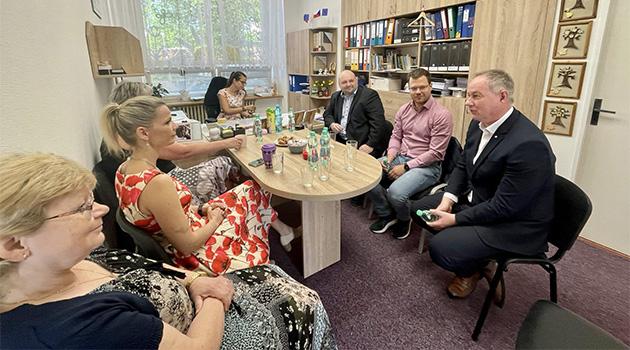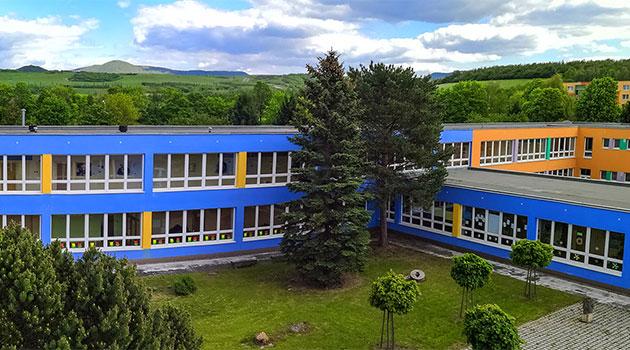Czech Education Minister: Situation at school that hired private security because of disruptive pupils has been blown out of proportion, new resources can help

In September, the Czech Education Ministry will launch its “Indexing the Schools” project, which will support 400 “disadvantaged schools” in the Czech Republic with CZK 1.8 billion [EUR 73 million], such as Bílina’s Za Chlumem Primary School, which has hired a private security agency to maintain order there since the beginning of the month. Czech Education Minister Petr Gazdík (Mayors and Independents – STAN) informed reporters of the project after visiting the school on Thursday.
According to Gazdík, the problems at the Bílina school have been caused by the fact that the advisory facility established by the Ústí nad Labem Regional Authority intervened too late and the child welfare authority (OSPOD) failed to intervene at all, although he also said its approach has improved since November 2021. There is just one advisory facility for pedagogical psychology in the Ústecký Region that manages detached workplaces throughout the region.
The problem is with their personnel staffing, which is lacking mainly in psychologists, explained the head of the Department of Education at the Regional Authority, Roman Kovář. “We do not have enough school psychologists in the region,” Kovář told the Czech News Agency.
“We are doing our best to resolve this with the local university, but it’s not easy. We have also been warning the Education Ministry of this fact for a long time,” he said.
According to Kovář, children can only visit counseling centers when accompanied by their guardians, but quite often their guardians are reportedly uninterested in bringing them there; the Department of Education at the Regional Authority said it is collaborating with the Bílina school even though technically the municipality is the entity that established the school. Aid for the Bílina school could be coming through the “Indexing the Schools” project, according to Kovář.
“They would get some resources on top of their budgets, but indeed, what we perceive here is the lack of school psychologists, and that is the matter that bothers us most,” he said. Money from the project could be used by schools like Za Chlumem to pay for meals for pupils, school supplies, and for social pedagogues and special needs educators.
“Banal things such as free lunches and snacks during the kindergarten year would help to motivate parents to send their children to school,” the Education Minister said. Among other matters, the Bílina primary school also suffers from “hidden” truancy.
In recent years, the school has reportedly been struggling with unmanageable children, especially in the sixth and seventh grades. According to Mayor Zuzana Schwarz Bařtipánová (Association of Dissatisfied Citizens – ANO), the schools should have greater powers, because currently it is just a child’s guardian who can decide whether to enroll that child in a special needs school or not.
Bařtipánová said that fact is due to the introduction of inclusive education in the Czech Republic, whereby every child has the right to attend regular school; she then accused parents of allegedly “not being interested” in their progeny and claimed that children with learning disabilities or psychiatric disorders are not visiting experts when they should because of parental neglect. The school is bothered by the fact that pupils, for example, have reportedly damaged school property, verbally assaulted their classmates and teachers, smoke cigarettes in the toilets, and have not adapted to the regime at the school.
However, Gazdík said he believes the situation in the Bílina school is being depicted as worse than it actually is. The school was also offered aid by the ROMEA organization, which has been organizing motivational discussions at primary schools throughout the Czech Republic since 2019.
The main focus of such discussions is encouraging children to study, to improve morale in the schools, and to prepare children for a future life as productive adults. The motivators are Romani high school and university students who have received scholarships from the ROMEA program.
According to Gazdík, another solution could be a change in how school catchment areas are drawn. Children from excluded localities could have a choice of several facilities to which they could apply if catchment areas were redrawn to make that possible.
“Inclusion does not just apply to children who are, to put it colloquially, not being raised well, or to children who have psychiatric diagnoses. Even before inclusive education began here such children were a problem,” the Education Minister said.
“A problem of the kind that exists here in Bílina can only be solved through collaboration among all of these organizations. The school is doing most things well,” the minister went on to say.
“What we are calling for, still, is an adjustment to the conditions so that schools will have greater powers to say which children can be taught in a normal class and parents do not have the final say in the matter,” the mayor told reporters, adding that she believes it is an open question whether inclusive education or parental neglect is to blame for these problems. “Then it is necessary that the Labor and Social Affairs Ministry and the Government approach this in a coordinated manner,” she added.
The school learned about the arrival of the Education Minister – which had been called for by principal Barbora Schneiderová – that same morning on Thursday. According to the principal, staff support is important for her school and money from the ministry’s project could possibly provide it.
